Farewellpublished at 16:59 GMT 3 January 2022
That's all from today's coronavirus live page. Thanks for joining us - we'll be back again on Tuesday.
Your writers today were Jack Hunter, Victoria Lindrea and Mal Siret.
Your editor was Dulcie Lee.
Boris Johnson says the NHS and hospitals are going to face "considerable pressure" in coming weeks due to the Covid surge
The government will stick to current Plan B measures in England while keeping everything under review
Although Omicron is clearly milder than other variants, it would be "folly" to think the pandemic is over, he adds
He also says the majority of people in intensive care have not been vaccinated or boosted
There are nearly 12,000 people in UK hospitals with Covid but that is far below the highest levels reached last winter
Hospital admissions in London may also have peaked, NHS bosses suggest
But a hospital trust in Lincolnshire has declared a critical incident due to Covid-related staff absences
All secondary school pupils in England will be tested for Covid before returning to classrooms, where they will have to wear masks
Edited by Dulcie Lee
That's all from today's coronavirus live page. Thanks for joining us - we'll be back again on Tuesday.
Your writers today were Jack Hunter, Victoria Lindrea and Mal Siret.
Your editor was Dulcie Lee.
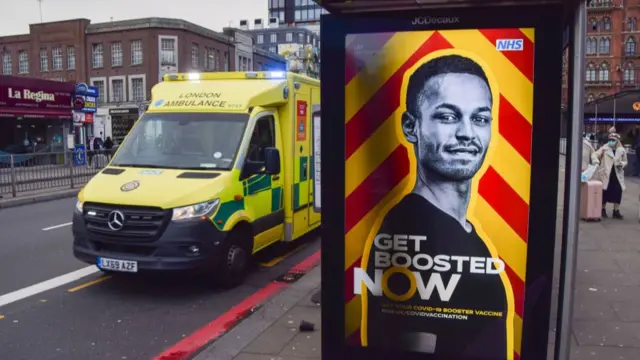 Image source, Getty Images
Image source, Getty ImagesHere's a reminder of the main developments from today:
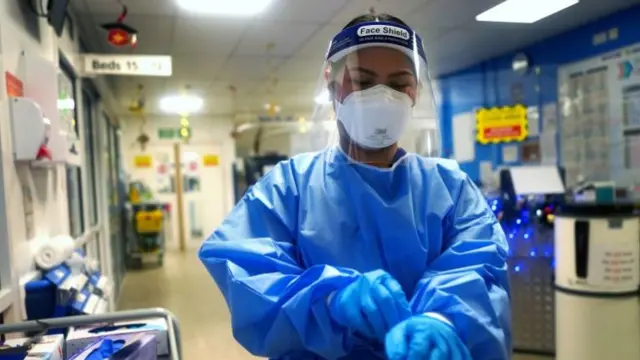 Image source, PA Media
Image source, PA MediaClive Kay, chief executive at King's College Hospital in London, says they are "still struggling with staff absence... but numbers have settled a little".
He estimates that approximately 500 out of 14,000 staff are currently absent because of Covid.
But he adds that although the numbers - proportionately - "appear not to be huge", the speed at which people have been testing positive is exacerbating rota issues.
It is "still a great challenge" to have sufficient staff to care for patients and make sure patients are safe, he tells the BBC.
He says there are around 360 patients in hospital wards with Covid, about 10% of whom were in intensive care - a lower proportion than in previous waves.
"Nonetheless, we do have some quite sick patients - and that is quite often linked to those patients being unvaccinated," he warns.

 Nick Triggle
Nick Triggle
Health Correspondent
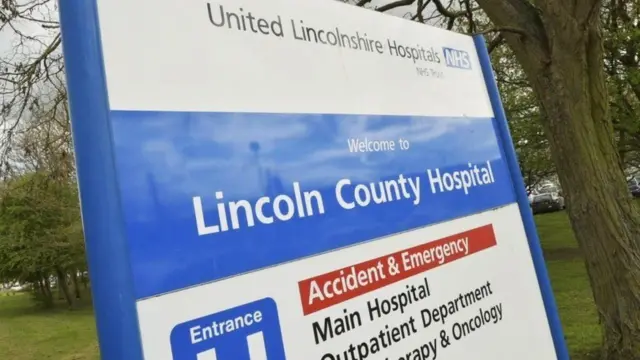 Image source, LDRS
Image source, LDRSA little earlier, we heard about a critical incident being declared at four Lincolnshire hospitals because of Covid-related staff shortages.
The situation in Lincolnshire is not unique.
It is understood at least half a dozen NHS trusts have declared critical incidents over the past week.
That is not that unusual in the depths of winter – the NHS is entering what is traditionally its busiest time of year.
But the scale and nature of the challenges are, of course, unprecedented - with growing rates of staff absences and the sheer volume of admissions for Covid.
At this time of year, the NHS can see around 1,000 admissions a day for all types of respiratory illness - it is receiving more than that just for Covid admissions - and the number is rising.
On top of that, hospitals are having to deal with high rates of staff absence because of Covid.
A critical incident does not mean emergency care stops being provided, rather it is an alert to the wider system that the trust is under acute pressure and needs help, such as getting staff redeployed from elsewhere.
Many of these incidents will be over in a few days.
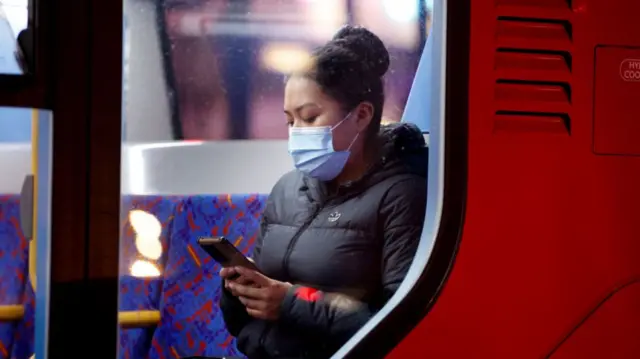 Image source, Getty Images
Image source, Getty ImagesAs we heard earlier, Boris Johnson said England will continue with its Plan B Covid measures for the time being.
Here's a reminder of what that means:
Find out the rules across the UK here.

 Chris Mason
Chris Mason
Political Correspondent
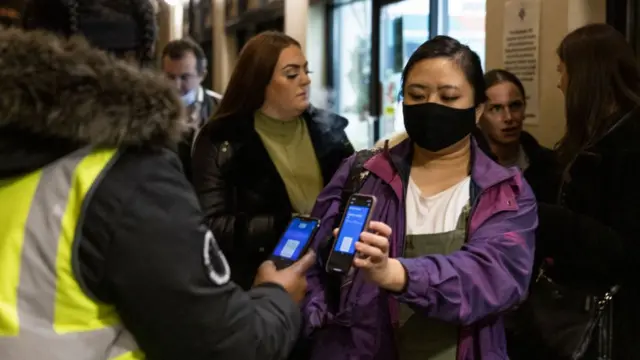 Image source, Getty Images
Image source, Getty ImagesCovid passes are needed for some venues in England under current Plan B measures
The government promised when it introduced new restrictions in England last month that they would be reviewed at the beginning of this month.
The date for that review is 5 January - this Wednesday.
It looks highly likely that that review will conclude that the existing measures - face coverings in indoor public places, working from home where possible and showing your Covid status to get into nightclubs and other crowded venues - will remain in place, but won't be added to, for now.
"The mixture of things that we're doing at the moment is, I think, the right one," the prime minister said earlier on a visit to a vaccination centre in Aylesbury in Buckinghamshire.
He added that the pressure on the NHS will be "considerable" in the coming weeks but that Omicron "was plainly milder than other variants".
So expect the status quo in England to rumble on until the end of the month, by which time the picture should be clearer as to what impact Christmas and New Year mixing has had on the number of people ending up in hospital with Covid.
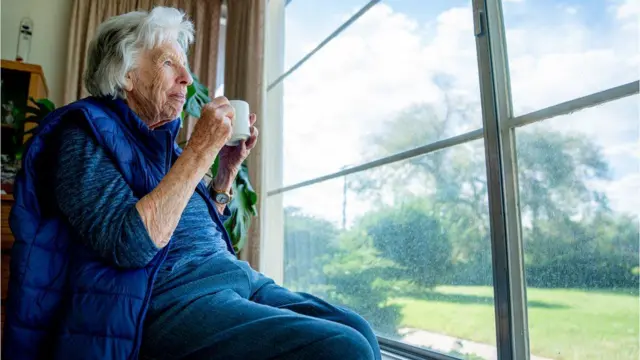 Image source, Getty Images
Image source, Getty ImagesAt least 120 care homes in Northern Ireland were dealing with Covid-19 outbreaks over the weekend, NI's Public Health Agency (PHA) has said.
Dr Gillian Armstrong, from the PHA, described the spread of the Omicron variant as "phenomenal" and suggested visitors to care homes exercise caution amid "an unprecedented level of community transmission".
"Each care home will make their own risk assessment according to the vulnerability of their patients and what their staffing levels are like," Dr Armstrong told the BBC.
It comes as Northern Ireland's Western Health and Social Care Trust suspended visits to its care homes and hospitals.
Private care homes are issuing their own guidance - with the Independent Health and Care Providers (IHCP) chief citing staff absence at the biggest problem at present.
Read more here.
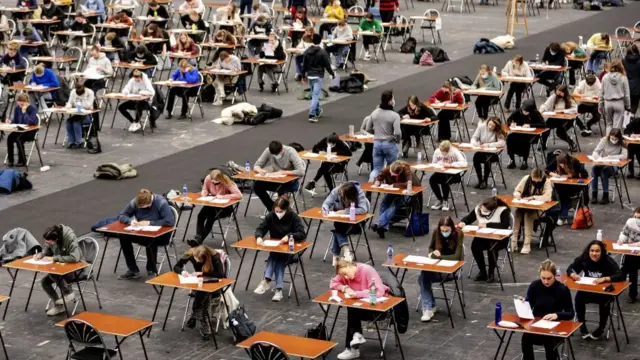 Image source, Getty Images
Image source, Getty ImagesDespite December's lockdown in the Netherlands, some students were allowed to take their exams
All primary and secondary schools in the Netherlands will reopen on 10 January, despite Covid cases there remaining high, the government has announced.
The country has been under a strict lockdown since December, which included closing schools a week early to help prevent children becoming infected and transmitting the virus to older relatives over the Christmas period.
But the Dutch government says hospital admissions have dropped considerably since the measures were introduced.
"This is good news for students and it's important for their development and their mental well-being that they can go to school," Education Minister Arie Slob said.
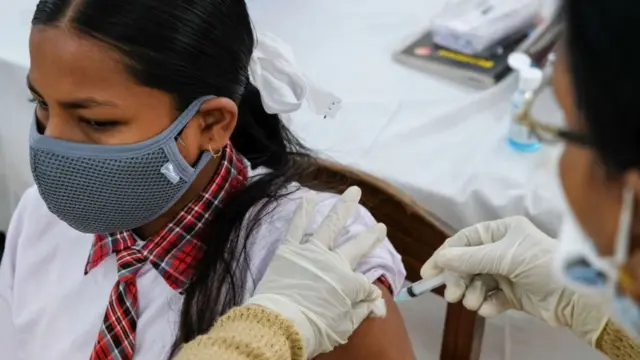 Image source, Getty Images
Image source, Getty ImagesIndia has vaccinated more than four million teenagers aged between 15 and 18 on the first day they became eligible for the jab.
The teenagers, many in their school uniforms, queued at schools and medical centres across the country as healthcare workers injected them with Bharat Biotech's Covaxin.
India is gripped by a sharp rise in cases, which have almost tripled in the past week, driven by Omicron.
The country recorded 33,750 new cases on Monday - the highest daily figure since September, but still far below the record high of 414,188 set in May.
One schoolboy, 17-year-old Kishan Bhuyan, queued for his jab in the eastern city of Bhubaneswar.
"I was waiting for this for so long," he told Reuters news agency. "I am now protected."
 Yolande Knell
Yolande Knell
BBC Middle East correspondent
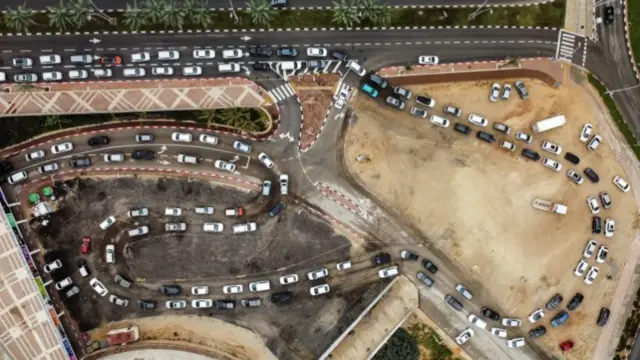 Image source, Reuters
Image source, ReutersPeople queue in their cars for Covid-19 tests in Ashdod, southern Israel
Israel has begun administering a fourth dose of the Pfizer-BioNTech vaccine to people aged over 60 and to healthcare workers who received their third shot at least four months ago.
Already, those eligible have been queuing at vaccination centres to get their jabs.
Announcing this new rollout in a TV address, Prime Minister Naftali Bennett told Israelis that they would now have a "new layer of protection", external, after the country's top medical officials signed off on the additional booster.
Last week, Israel approved a fourth dose for elderly people in care homes and those with compromised immune systems.
Like other countries, Israel has seen a rapid rise in daily Covid-19 cases driven by the highly-transmissible Omicron variant. Numbers have increased almost fourfold in the past week.
 Image source, Reuters
Image source, ReutersPassengers stuck on board a large German cruise ship moored in Lisbon for five days as Covid infections spread have been permitted to disembark.
The ship, named AIDAnova, arrived in the Portuguese capital on Wednesday carrying 2,844 passengers and 1,353 crew.
It was travelling to the island of Madeira, where passengers were due to celebrate the new year. However it remained at Lisbon's port after dozens of staff - who were reportedly fully vaccinated - tested positive for coronavirus.
They were sent to hotels in Lisbon to isolate and the ship was allowed to leave the port on Sunday.
But after more infections were detected, including among passengers, there was no option but to end the cruise, Port Capt Diogo Vieira Branco told a local radio station.
He said everyone infected had been made to isolate immediately.
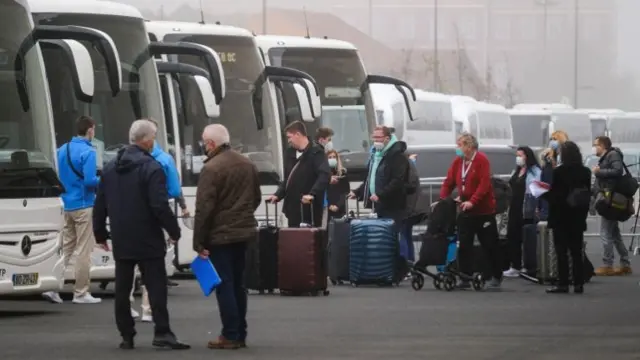 Image source, Reuters
Image source, ReutersSome 68 cases in total have been confirmed, Reuters news agency reports.
"We all want this to end. We're going home," one passenger said.
A little earlier, Education Secretary Nadhim Zahawi said that while Covid was spreading among the over-50s, the vast majority of this age group had received their booster shots.
"It's generally the over-50s who end up with severe infection and hospitalisation," he told the BBC.
"The good news on that is 90% of them have been boosted now - 34 million booster jabs."
While uptake of first and second doses has dropped off as the vast majority of people have had these jabs, recent data shows there has been a steep rise in people having boosters.
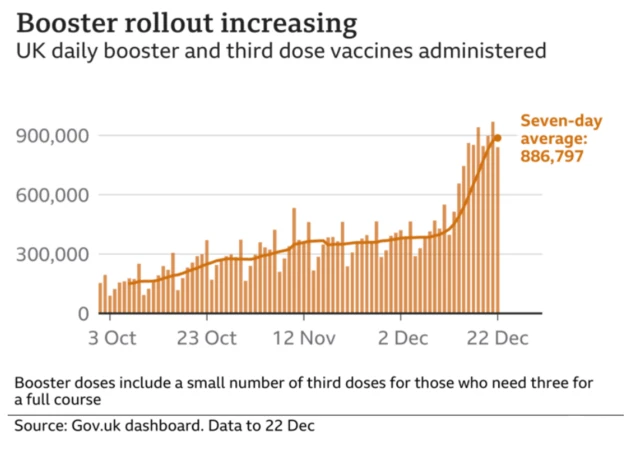
The highest rates of vaccination are among the oldest age groups.
Zahawi has now urged all 12 to 15-year-olds to get both doses of the Covid vaccine and for older children to get their booster jabs.
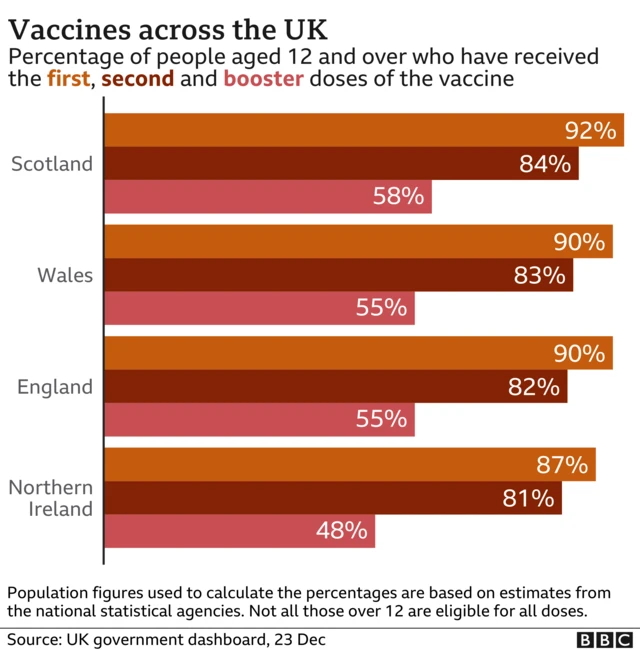
Find out more about how the rollout is going here.
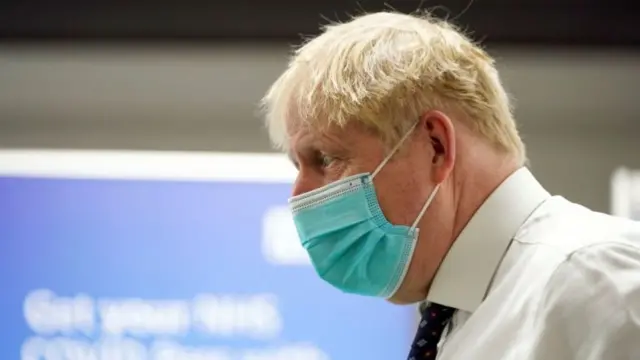 Image source, Reuters
Image source, ReutersIf you're just joining us, here's a recap of what's happened so far today:

 Nick Triggle
Nick Triggle
Health Correspondent
The problem facing the government is that the window to suppress the peak with restrictions may already have passed.
Modelling produced for government by Warwick University shows even a return to lockdown, with only schools open, would have virtually no impact on hospitalisations now.
To have had a significant impact, measures would need to have been introduced on Boxing Day or a week earlier.
But even then the argument was unclear – in both scenarios infections and hospitalisations rebound once restrictions are lifted. Largely all it would have achieved is delaying and spreading out illness.
That could have been of some benefit - by evening out the pressure on the NHS.
But there is, of course, the wider costs of restrictions to society, the economy and mental health to factor in.
Some say it would also have bought time to carry out more vaccinations, but with nine in 10 of the most vulnerable boosted, and evidence that protection wanes over time, this may actually be the point in time when we have the most immunity across the population.
There are no simple solutions to this Omicron wave – and any options that the government had may well have gone.
Scotland has once again recorded its highest daily number of Covid infections since the start of the pandemic.
A further 20,217 people tested positive for the coronavirus over the latest 24-hour period.
The figures, from Public Health Scotland, are the first to be published in 2022 - after the last tranche, also showing record cases, was released on 29 December.
Official statistics also showed more than 1,000 people were in hospital - the highest since October last year.
The Scottish government said there had been delays in results being reported due to the high volume of tests.
It said the figure had also been impacted by the holiday weekend.
Read more here.
Boris Johnson says the UK is in a much stronger position than last year but says it would be "folly" to think the pandemic was "all over".
Listen to what he has about the state of play below.
The PM spoke to reporters at a vaccination centre in Aylesbury, Buckinghamshire
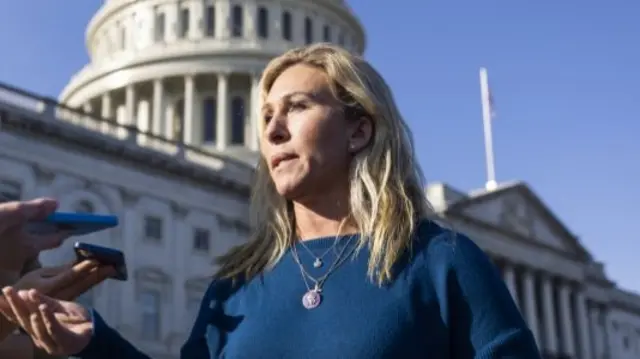 Image source, EPA
Image source, EPATwitter has permanently suspended the personal account of US Congresswoman Marjorie Taylor Greene for repeated violations of its rules around coronavirus misinformation.
The action against the Republican lawmaker came under Twitter's strike system, which identifies posts about the virus that could cause harm.
The Georgia congresswoman, who had been suspended four times prior to the latest action, said the ban proved the company was "an enemy to America".
In a lengthy statement posted to the social media outlet Telegram, the 47-year-old said "social media platforms can't stop the truth from being spread far and wide" and accused Twitter of aiding unidentified enemies in "a communist revolution".
Rep Greene's ban comes after she tweeted on Saturday, falsely, about "extremely high amounts of Covid vaccine deaths" in the US.
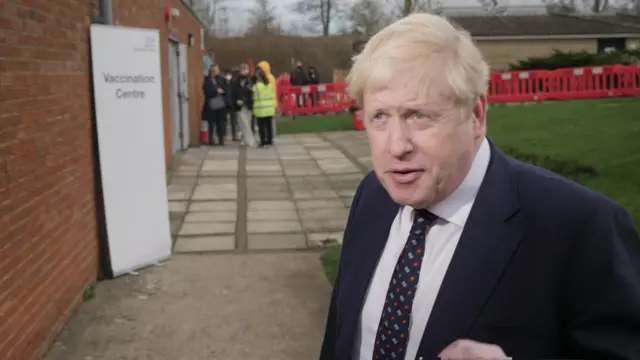
The prime minister says the government will "continue to look" at how long people are infectious for after catching Covid - to see if self-isolation times can be cut any further.
But he adds: "The key thing is, we don't want to be releasing people back into the workplace when they're still infectious."
At the moment, people in England, Wales and Northern Ireland who have Covid can stop isolating after seven days if they test negative on day six and seven.
Some have called for a US-style system, where fully vaccinated people must quarantine for five days.
But the UK Health Security Agency (UKHSA) said doing so would be counterproductive and could actually worsen staff shortages if it led to more people being infected.
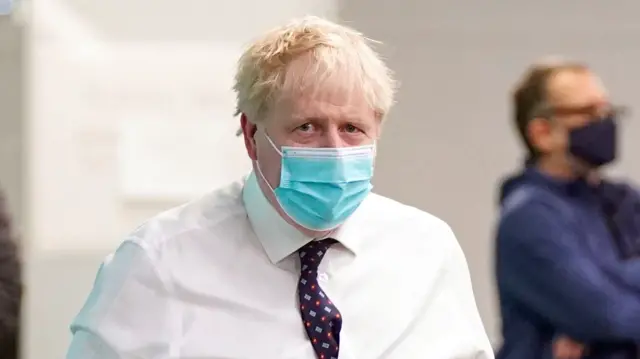 Image source, Reuters
Image source, ReutersMore now from the prime minister on mask-wearing in classrooms in England.
Boris Johnson says he doesn't like the idea of masks in classrooms but there is evidence they can cut transmission rates.
Asked what he made of Conservative MPs who oppose the new guidance, he says: "There is an increasing body of scientific support for the idea that face masks can decrease transmission."
But the prime minister says mask-wearing in schools will not be kept on "for a day longer than is necessary".
"We don't want to keep them. I don't like the idea of having face masks in [the] classroom any more than anybody else does," he tells reporters.
England will continue with its Plan B Covid measures for the time being, the prime minister confirms, saying it would be "folly" to think the pandemic was over.
Boris Johnson says the measures - which include compulsory mask-wearing in some settings, working from home where possible, and Covid passes for some venues - will stay for now.
The PM says the "way forward for the country as a whole is to continue on the path that we are on, but of course we'll keep all the data under review".
"It will be absolute folly to say that this thing is all over... we've got to stick with Plan B," he says.